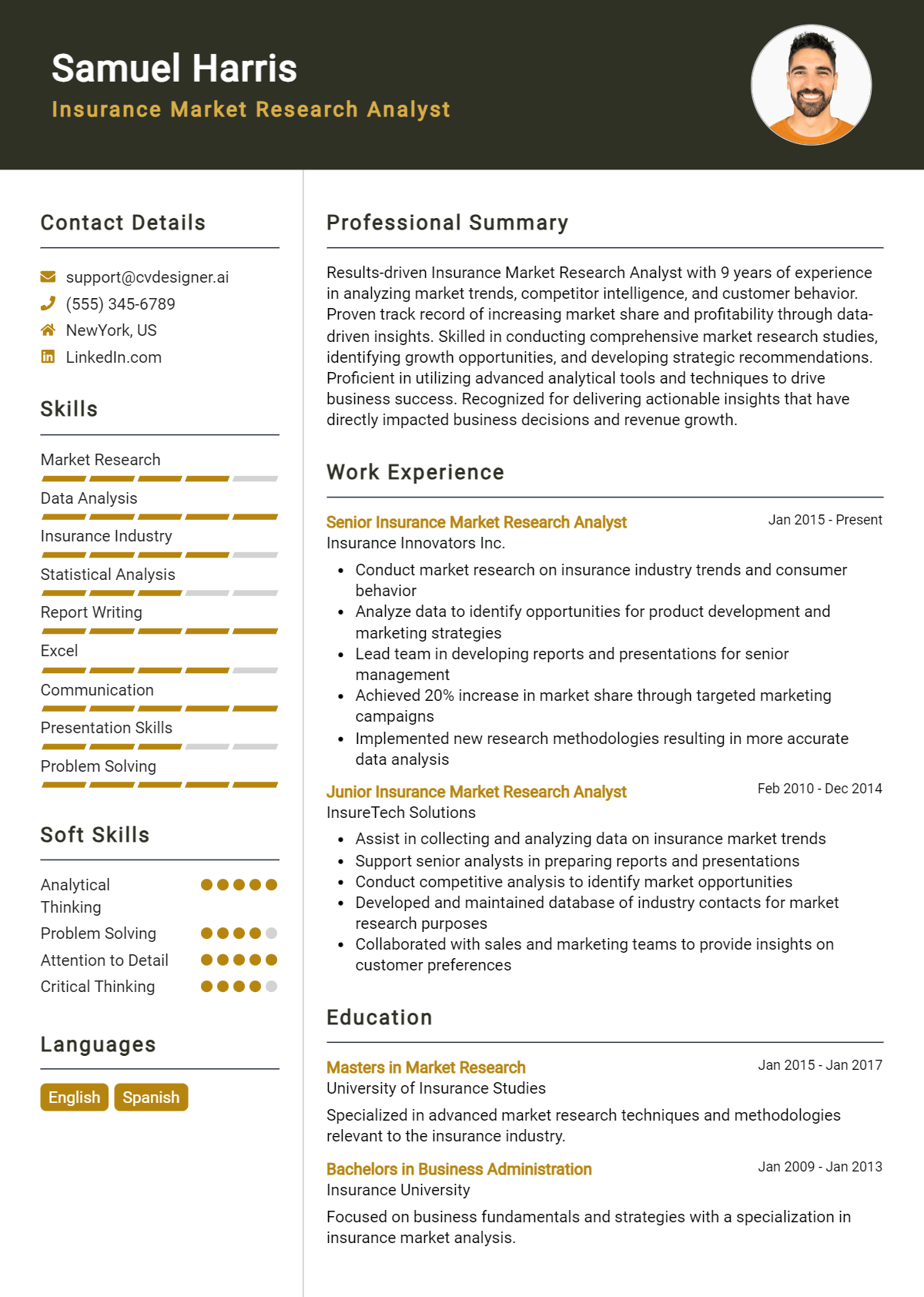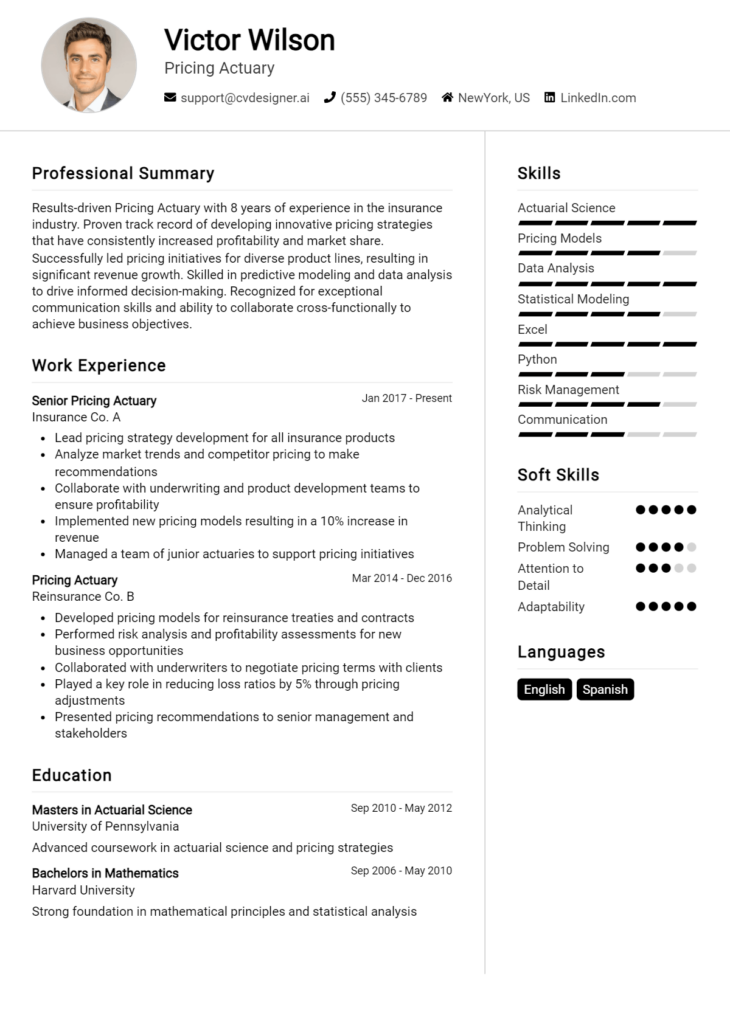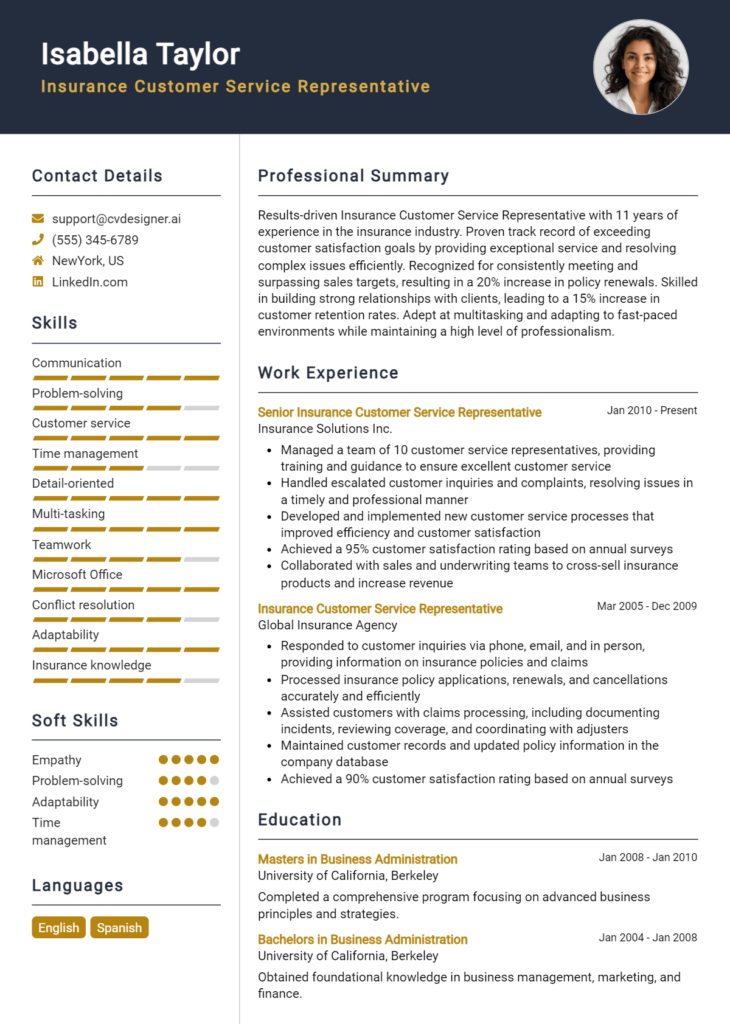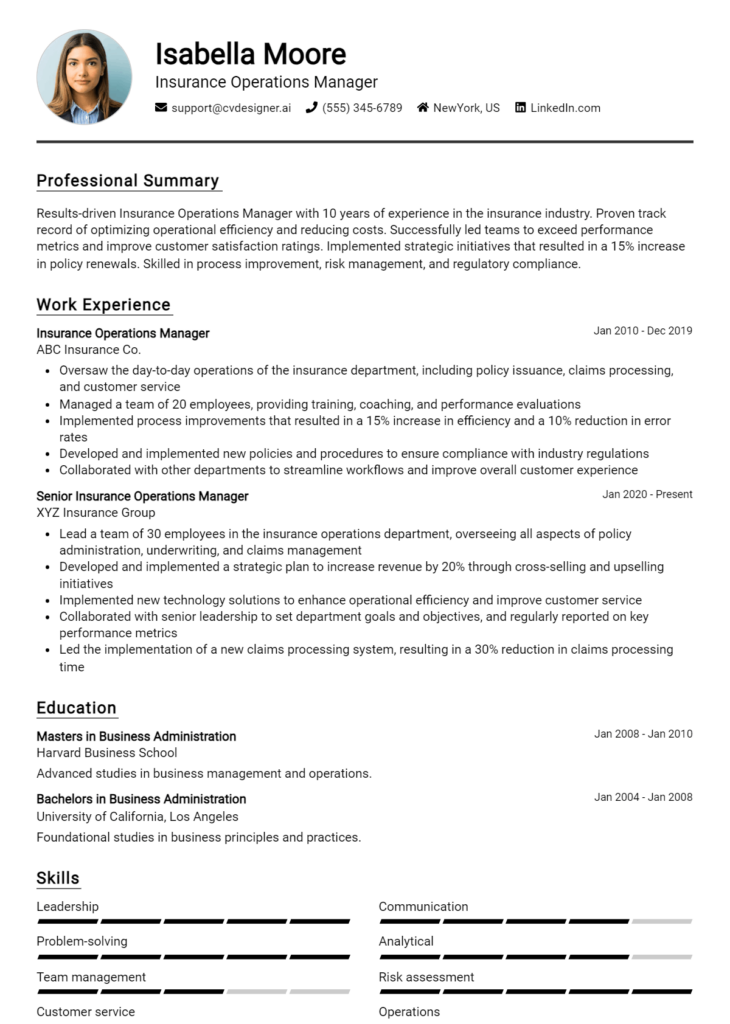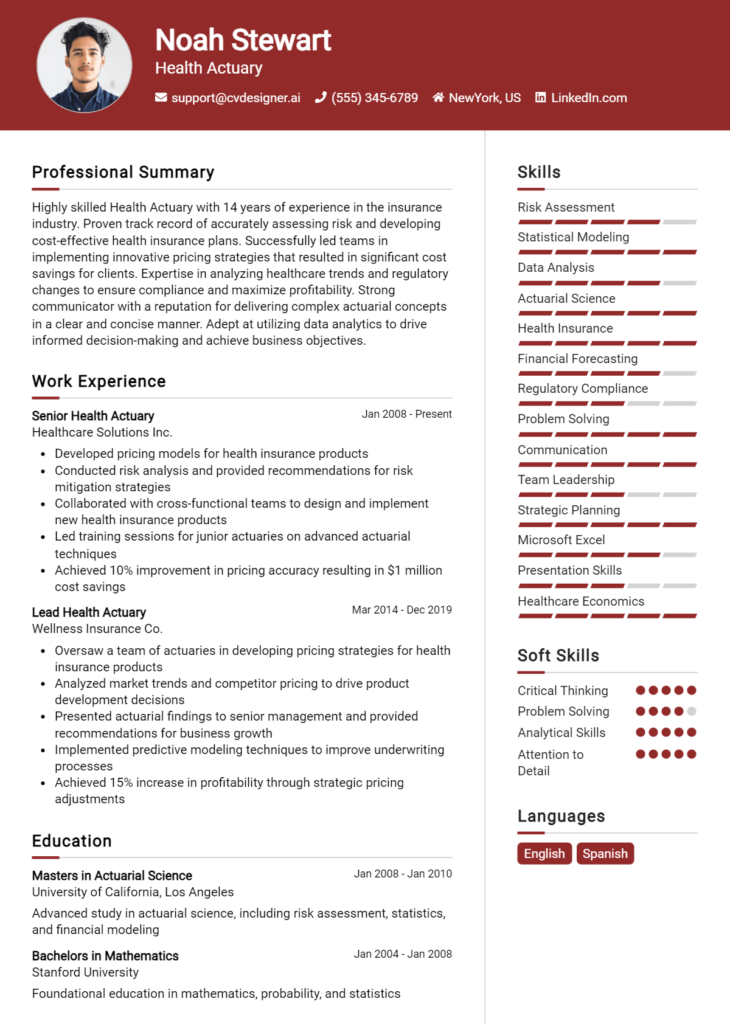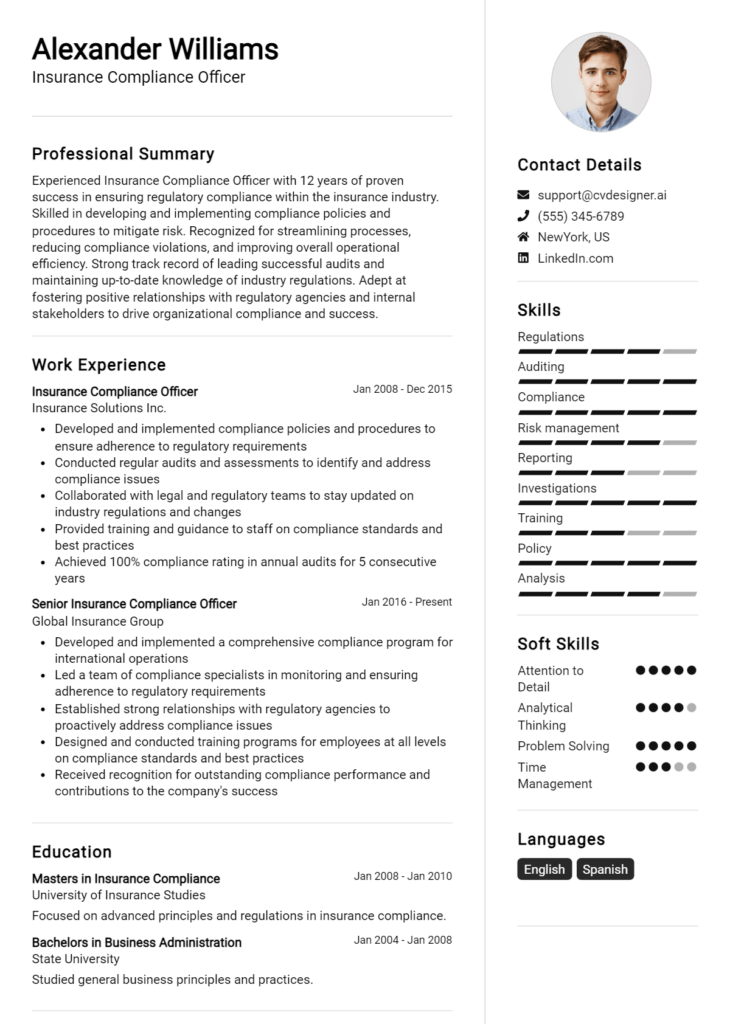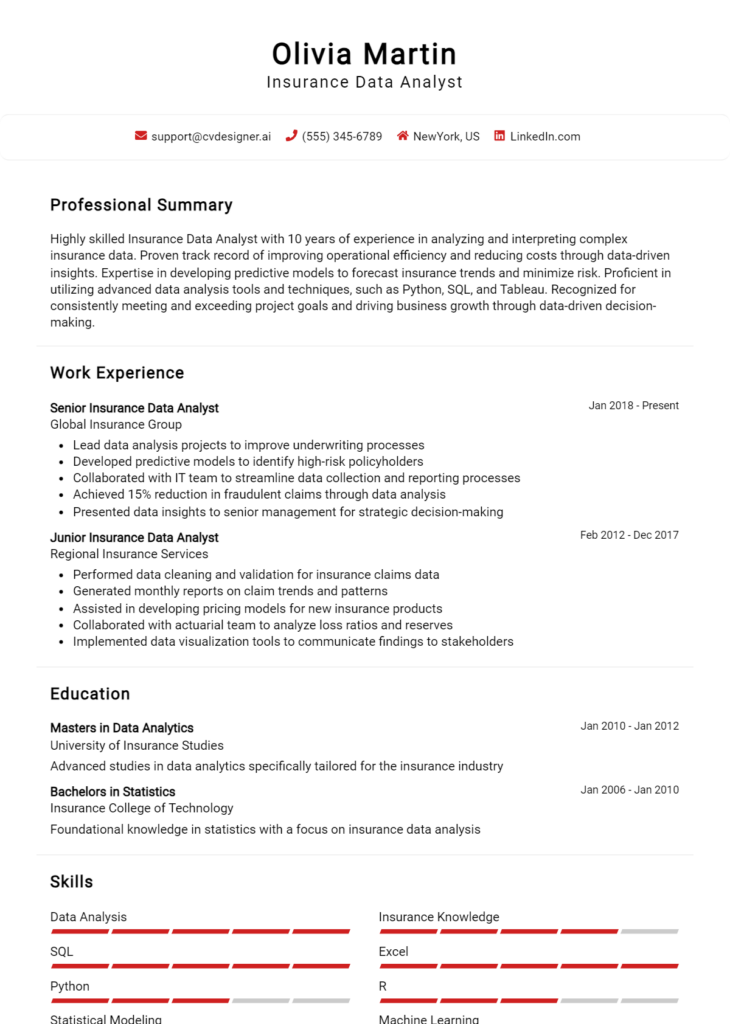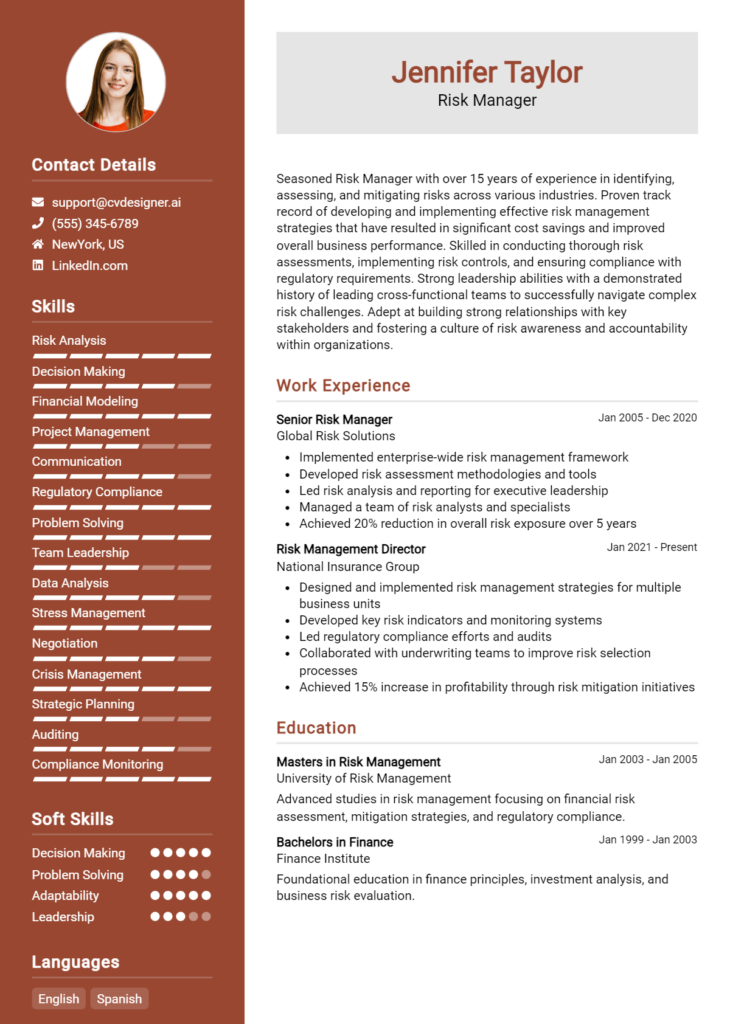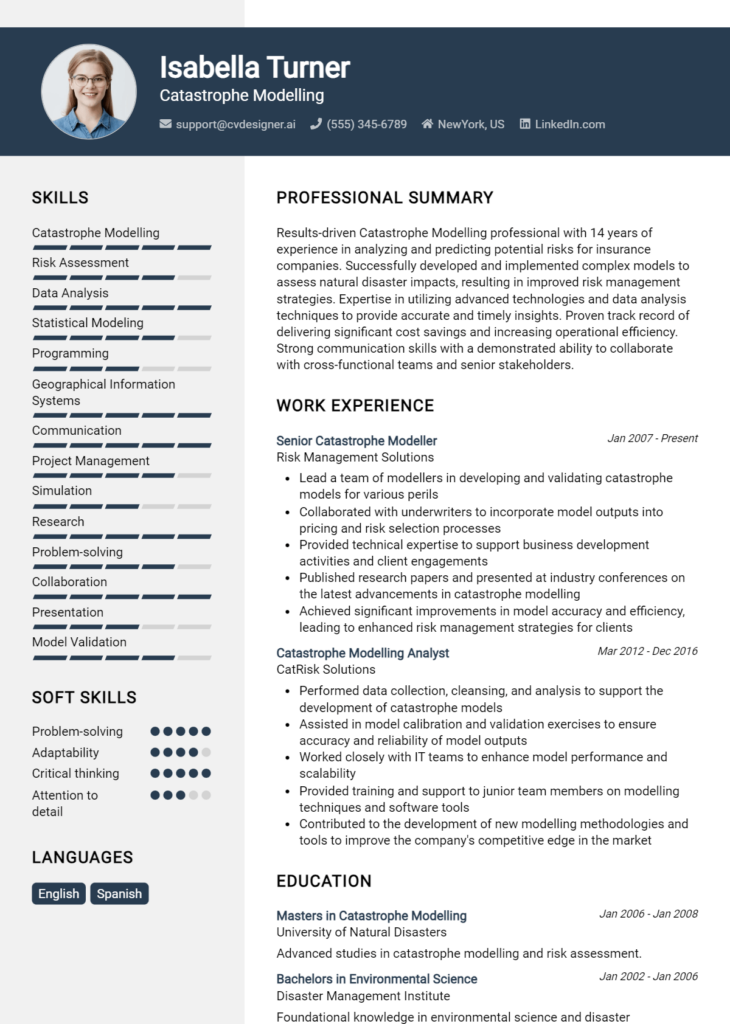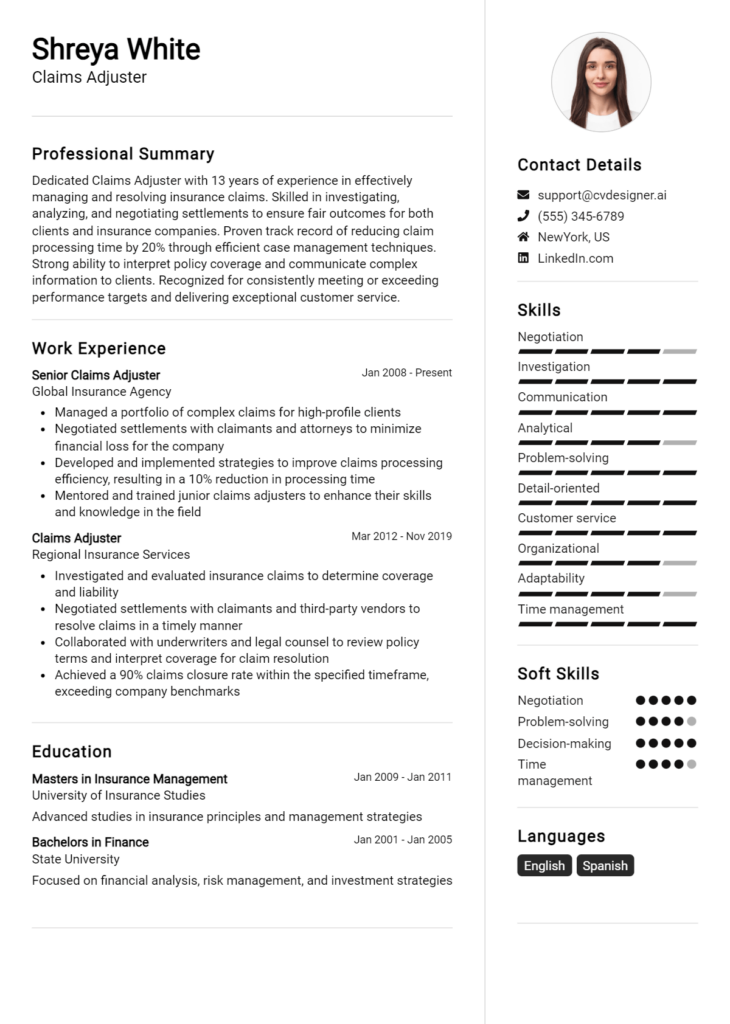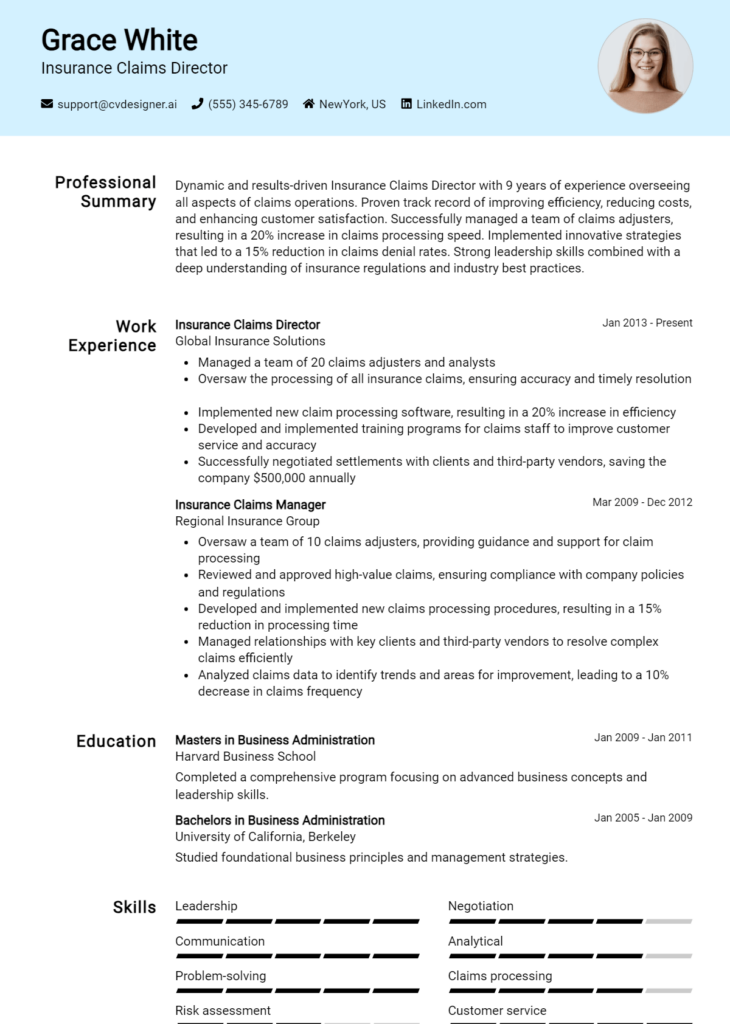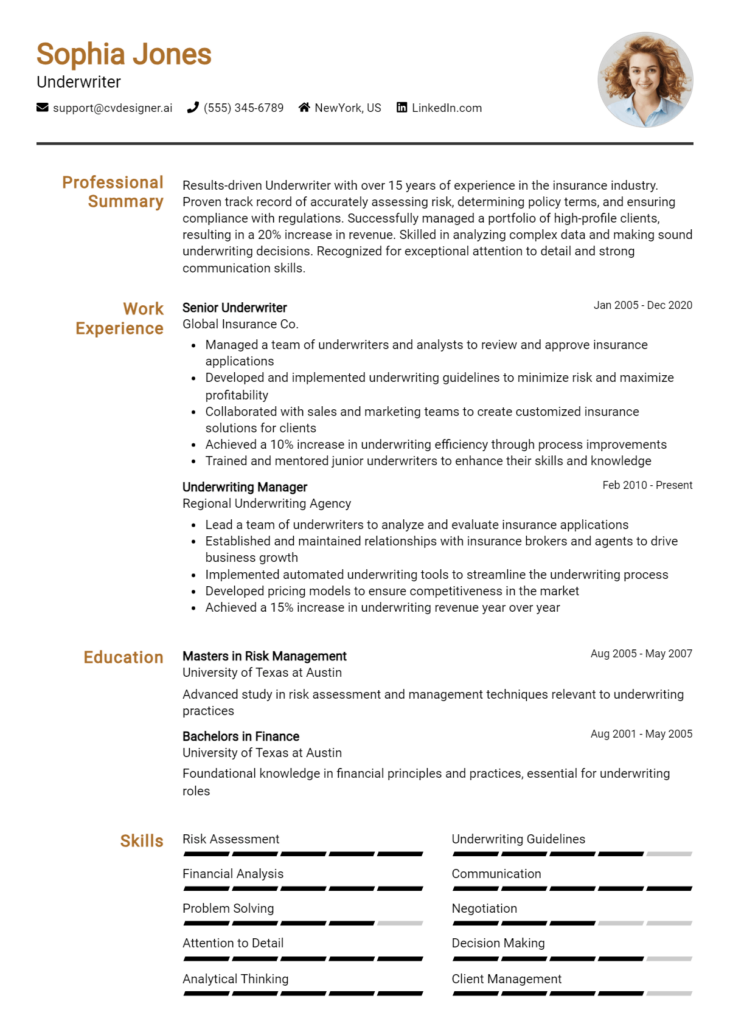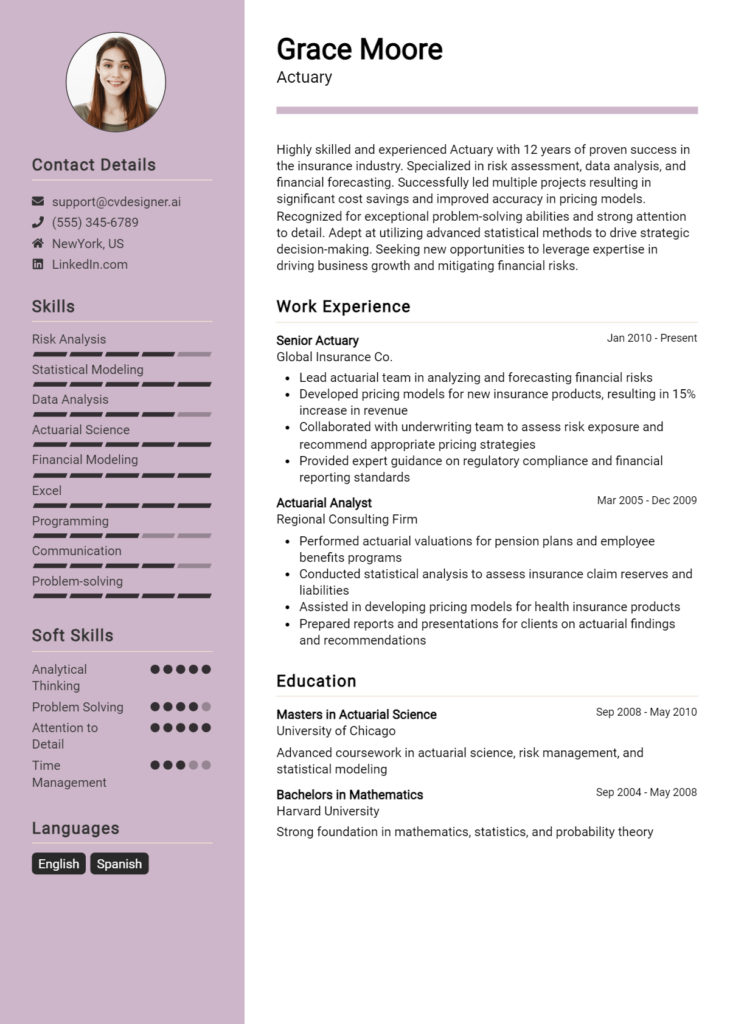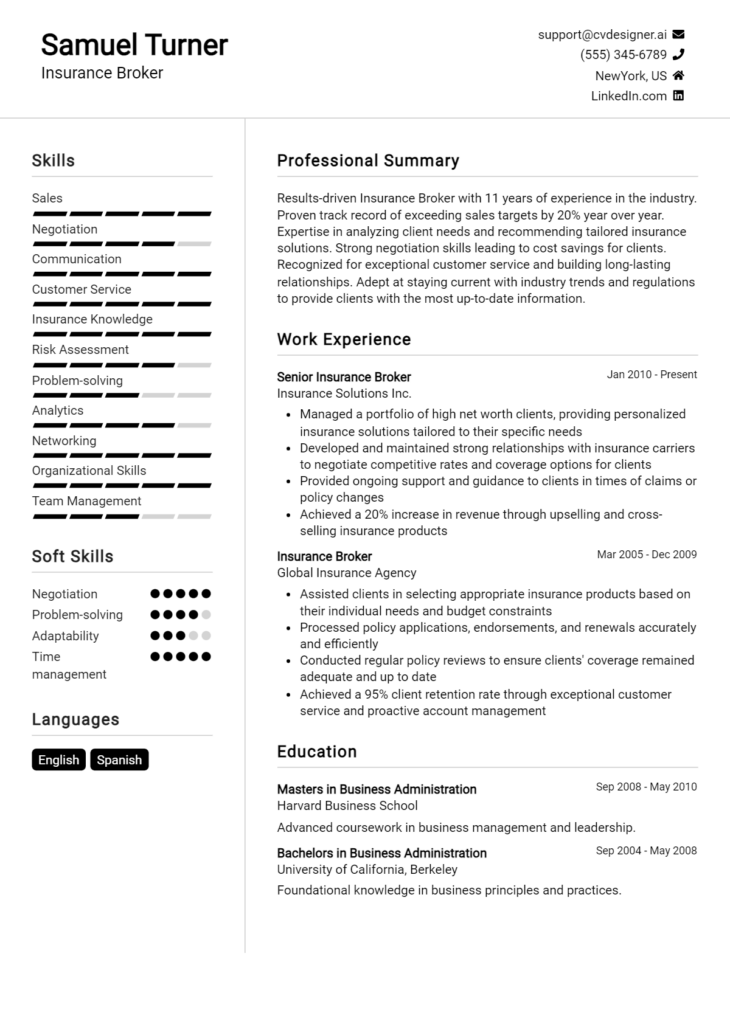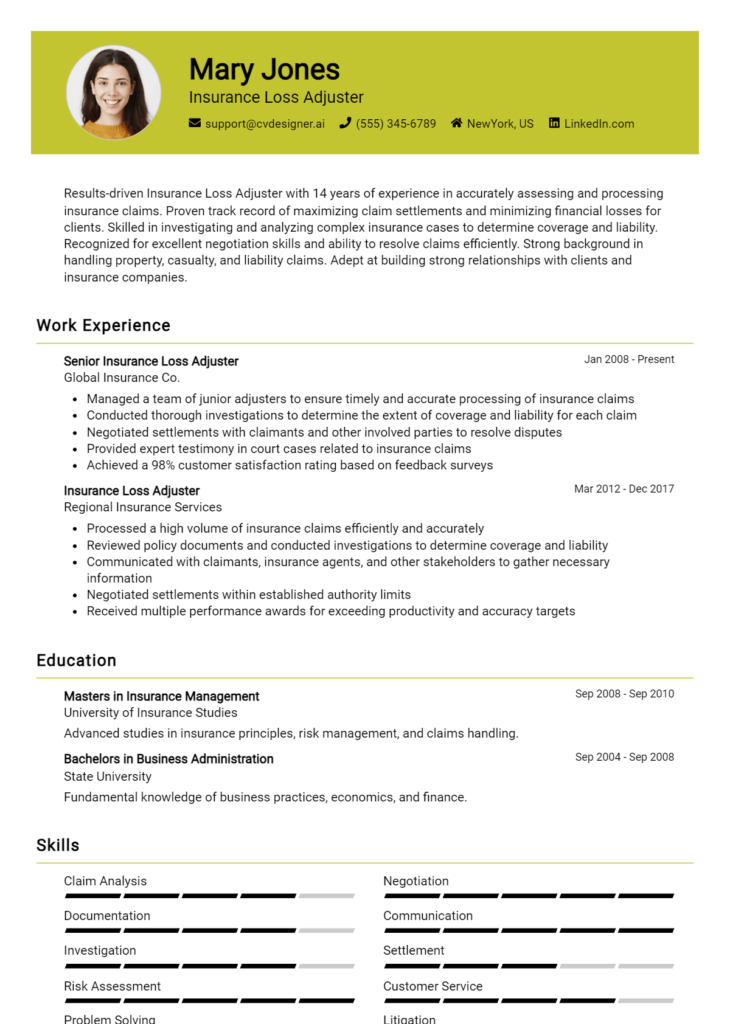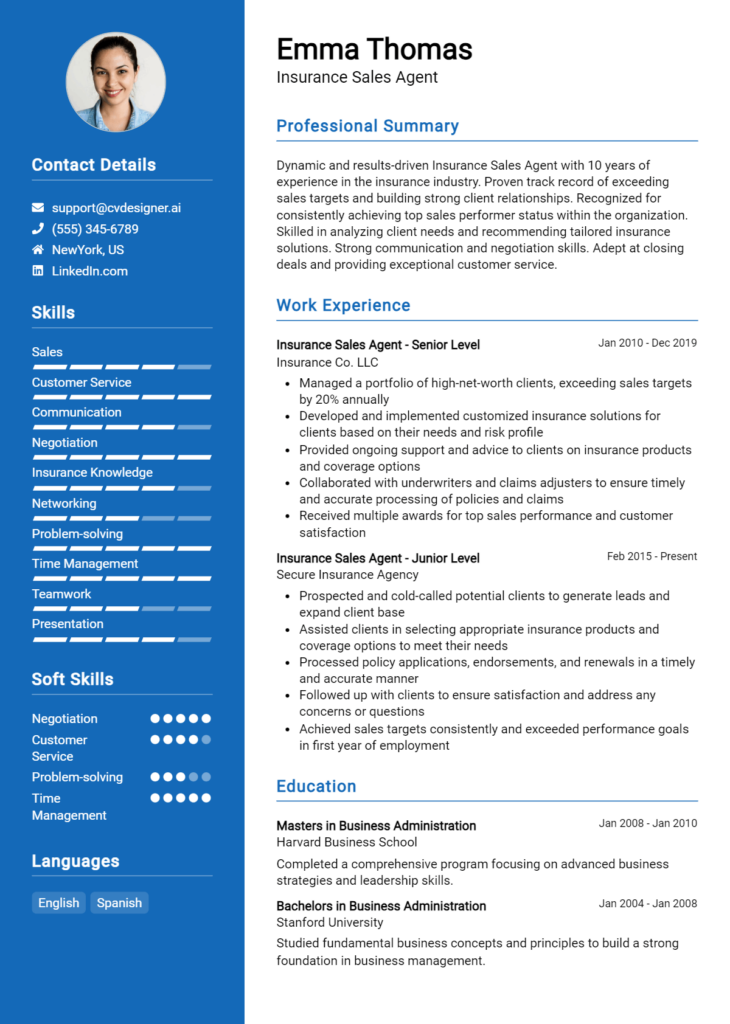Insurance Market Research Analyst Core Responsibilities
An Insurance Market Research Analyst plays a critical role by bridging various departments, including underwriting, sales, and marketing. Key responsibilities include analyzing market trends, conducting competitive analysis, and providing actionable insights to optimize product offerings. This role demands strong technical skills in data analysis, operational proficiency in insurance processes, and problem-solving abilities to address market challenges. These competencies are vital for achieving organizational goals, and a well-structured resume can effectively highlight these qualifications, enhancing career prospects.
Common Responsibilities Listed on Insurance Market Research Analyst Resume
- Conduct in-depth market research to identify trends and opportunities.
- Analyze competitor products, pricing, and market strategies.
- Prepare comprehensive reports and presentations for stakeholders.
- Collaborate with underwriting and sales teams to refine product offerings.
- Utilize statistical tools and software for data analysis.
- Monitor regulatory changes and their potential impact on the market.
- Gather and interpret consumer feedback to inform product development.
- Develop and maintain databases of market intelligence.
- Assist in strategic planning and forecasting efforts.
- Present findings to management and recommend strategic initiatives.
- Identify and evaluate emerging market segments and trends.
- Support marketing campaigns through targeted market insights.
High-Level Resume Tips for Insurance Market Research Analyst Professionals
In the competitive field of insurance market research, a well-crafted resume is your first opportunity to make a lasting impression on potential employers. It serves as a snapshot of your professional journey, showcasing your skills, experiences, and achievements. For Insurance Market Research Analyst professionals, this document needs to be meticulously tailored to reflect not only your analytical abilities but also your understanding of market dynamics and trends. In this guide, we will provide practical and actionable resume tips specifically designed for those in the insurance sector, helping you to effectively communicate your value to potential employers.
Top Resume Tips for Insurance Market Research Analyst Professionals
- Tailor your resume to the job description by incorporating relevant keywords and phrases that align with the specific requirements of the role.
- Highlight your relevant experience in market research, data analysis, and insurance industry knowledge, emphasizing your ability to interpret complex data.
- Quantify your achievements by using metrics to demonstrate your impact, such as the percentage increase in market share or revenue growth resulting from your research.
- Showcase your proficiency in industry-specific tools and software, such as statistical analysis programs or market research databases.
- Include a summary statement at the top of your resume that captures your expertise and what you bring to the table as an Insurance Market Research Analyst.
- Emphasize soft skills such as communication, teamwork, and problem-solving, which are essential in collaborating with other departments and presenting findings.
- Keep your resume concise and focused, ideally one page, ensuring that every word adds value to your application.
- Utilize a clean and professional format that enhances readability, with clear headings and bullet points to break up large blocks of text.
- Incorporate any relevant certifications or continued education courses that showcase your commitment to professional development in the insurance sector.
By implementing these tips, you can significantly enhance your chances of landing a job in the Insurance Market Research Analyst field. A well-structured and tailored resume not only highlights your qualifications but also demonstrates your understanding of the industry’s demands, making you a more appealing candidate to potential employers.
Why Resume Headlines & Titles are Important for Insurance Market Research Analyst
In the competitive field of insurance market research, a well-crafted resume headline or title plays a pivotal role in capturing the attention of hiring managers. A strong headline serves as the first impression, summarizing a candidate's key qualifications in a succinct and impactful manner. It should be concise, relevant, and directly aligned with the specific job being applied for, allowing hiring professionals to quickly gauge the candidate’s fit for the position. An effective resume headline not only draws attention but also sets the tone for the rest of the resume, making it an essential element for aspiring insurance market research analysts.
Best Practices for Crafting Resume Headlines for Insurance Market Research Analyst
- Keep it concise: Aim for a headline that is one sentence or a phrase long.
- Be specific: Use keywords that reflect the role and responsibilities of an insurance market research analyst.
- Highlight key strengths: Focus on your most relevant skills, experience, or accomplishments.
- Use action words: Incorporate dynamic verbs to convey your proactive approach.
- Tailor for the job: Customize your headline for each application to align with the job description.
- Avoid jargon: Use clear, straightforward language that is easily understandable.
- Focus on results: If applicable, include quantifiable achievements to demonstrate impact.
- Maintain professionalism: Ensure that the tone is suitable for the corporate environment.
Example Resume Headlines for Insurance Market Research Analyst
Strong Resume Headlines
"Data-Driven Insurance Market Research Analyst with 5+ Years in Strategic Insights and Analysis"
“Results-Oriented Analyst Specializing in Insurance Trends and Competitive Analysis”
“Experienced Market Research Analyst with Proven Track Record in Enhancing Insurance Product Strategies”
Weak Resume Headlines
“Analyst Looking for a Job”
“Experienced Professional”
Strong headlines are effective because they provide a clear snapshot of the candidate's qualifications and areas of expertise, capturing the attention of hiring managers right away. They convey specific skills and experiences that are relevant to the job, making it easier for recruiters to see the candidate's potential fit for their organization. In contrast, weak headlines fail to impress because they are vague and non-specific, offering little information about the candidate’s qualifications or relevance to the position. By avoiding generic phrases, candidates can ensure their resumes stand out in a crowded field.
Writing an Exceptional Insurance Market Research Analyst Resume Summary
A resume summary is a crucial component for an Insurance Market Research Analyst, serving as the candidate's first opportunity to make a lasting impression on hiring managers. A well-crafted summary quickly captures attention by succinctly highlighting key skills, relevant experience, and significant accomplishments that align with the job role. In a competitive job market, it is essential for the summary to be concise, impactful, and tailored to the specific position being applied for, effectively setting the tone for the rest of the resume.
Best Practices for Writing a Insurance Market Research Analyst Resume Summary
- Quantify achievements with specific metrics to demonstrate impact.
- Highlight relevant skills that are in line with the job description.
- Use industry-specific terminology to showcase expertise.
- Keep it concise, ideally between 2-4 sentences.
- Tailor the summary to the specific job to show genuine interest.
- Focus on unique selling points that differentiate you from other candidates.
- Incorporate keywords from the job description to pass applicant tracking systems.
- Reflect a professional tone that aligns with the company culture.
Example Insurance Market Research Analyst Resume Summaries
Strong Resume Summaries
Dynamic Insurance Market Research Analyst with over 5 years of experience in data analysis and competitive intelligence, achieving a 30% increase in market share for key clients through strategic insights and recommendations.
Detail-oriented analyst skilled in utilizing advanced statistical tools to identify emerging trends in the insurance sector, resulting in a 20% improvement in forecasting accuracy over the past year.
Proven track record of conducting comprehensive market assessments and delivering actionable insights that have led to successful product launches, yielding an average revenue increase of $1M annually.
Results-driven market researcher with expertise in customer segmentation and risk analysis, recognized for optimizing client engagement strategies that drove a 25% boost in policy retention rates.
Weak Resume Summaries
Experienced analyst with knowledge of market research and some skills in data analysis.
Insurance market researcher looking for a job where I can utilize my skills and experience.
The examples provided illustrate the stark contrast between strong and weak resume summaries. Strong summaries are specific, quantifiable, and tailored to the Insurance Market Research Analyst role, clearly showcasing the candidate's achievements and skills. In contrast, weak summaries lack detail, are overly generic, and fail to convey the candidate's value, making them less effective in capturing the attention of potential employers.
Work Experience Section for Insurance Market Research Analyst Resume
The work experience section of an Insurance Market Research Analyst resume is critical, as it provides potential employers with a clear picture of the candidate's professional journey and capabilities. This section highlights the technical skills acquired through hands-on experience, the ability to effectively manage teams and projects, and the commitment to delivering high-quality analytical products. By quantifying achievements and aligning past experiences with industry standards, candidates can create a compelling narrative that demonstrates their value in the insurance market research field.
Best Practices for Insurance Market Research Analyst Work Experience
- Use quantifiable metrics to demonstrate the impact of your work, such as percentage improvements or revenue growth.
- Highlight specific technical skills relevant to insurance market analysis, such as data analytics tools and statistical software.
- Showcase collaboration by detailing teamwork on projects, including roles and contributions.
- Use action verbs to describe responsibilities and achievements, making your experience sound dynamic and impactful.
- Align your experiences with industry standards by referencing recognized methodologies or frameworks in market research.
- Include relevant certifications or training that bolster your qualifications as an analyst in the insurance sector.
- Tailor your work experience to the job description, emphasizing experiences that directly relate to the role you're applying for.
- Maintain a clear and concise format, making it easy for hiring managers to quickly assess your qualifications.
Example Work Experiences for Insurance Market Research Analyst
Strong Experiences
- Led a team of 5 analysts in conducting market research that resulted in a 30% increase in policy sales for a major insurance provider within one year.
- Developed and implemented a predictive modeling tool that improved customer retention rates by 15%, contributing to an overall revenue increase of $2 million.
- Collaborated with cross-functional teams to create a comprehensive market entry strategy, which successfully identified $3 million in untapped market potential.
- Streamlined data collection processes using advanced statistical software, reducing analysis time by 40% and enhancing report accuracy.
Weak Experiences
- Worked with data for various projects without specifying the outcomes or tools used.
- Assisted in market research tasks as part of a team but did not detail personal contributions or results achieved.
- Performed analysis of market trends without quantifying the impact on the organization or outlining specific methodologies.
- Conducted research for clients but failed to highlight how the findings were applied or the benefits realized.
The experiences labeled as strong are considered impactful because they provide clear, quantifiable outcomes, demonstrate technical leadership, and show effective collaboration within teams. In contrast, the weak experiences lack specific details and measurable results, making them less compelling to potential employers. Strong experiences clearly articulate the candidate's contributions and the positive effects on the organization, while weak experiences fail to provide enough context or significance.
Education and Certifications Section for Insurance Market Research Analyst Resume
The education and certifications section of an Insurance Market Research Analyst resume is crucial for showcasing a candidate's academic background and dedication to professional growth. This section highlights relevant degrees, industry-recognized certifications, and specialized training that align with the demands of the role. By providing detailed information about coursework and certifications, candidates can enhance their credibility in the field and demonstrate their commitment to continuous learning. This not only reflects their expertise but also signals to potential employers that they are well-prepared to tackle the challenges of market research within the insurance industry.
Best Practices for Insurance Market Research Analyst Education and Certifications
- Include relevant degrees such as a Bachelor's or Master's in Finance, Economics, Statistics, or a related field.
- Highlight industry-recognized certifications, such as Chartered Property Casualty Underwriter (CPCU) or Associate in Risk Management (ARM).
- Provide details about relevant coursework that demonstrates your knowledge of market analysis, risk assessment, and data analytics.
- List any specialized training or workshops that pertain directly to insurance market research methodologies.
- Use clear and concise formatting to enhance readability and organization.
- Prioritize certifications that are current and recognized within the insurance industry.
- Include any advanced degrees or additional qualifications that set you apart from other candidates.
- Be honest and avoid exaggerating qualifications or certifications.
Example Education and Certifications for Insurance Market Research Analyst
Strong Examples
- Bachelor of Science in Finance, University of XYZ, 2020
- Master of Science in Data Analytics, ABC University, 2022
- Certified Insurance Counselor (CIC), National Alliance for Insurance Education & Research, 2021
- Advanced Statistical Methods for Market Research, Online Course, 2023
Weak Examples
- Bachelor of Arts in History, University of ABC, 2018
- Certification in Basic Computer Skills, 2017
- Diploma in Fashion Merchandising, XYZ College, 2019
- Outdated certification in Insurance Adjusting, obtained in 2015
The examples are considered strong because they directly relate to the skills and knowledge required for the Insurance Market Research Analyst role, featuring relevant degrees and certifications that demonstrate the candidate's preparedness for the position. In contrast, the weak examples are not aligned with the job requirements; they include unrelated fields of study and outdated qualifications, which do not enhance the candidate's profile in the context of insurance market research.
Top Skills & Keywords for Insurance Market Research Analyst Resume
As an Insurance Market Research Analyst, possessing the right skills is crucial for success in this dynamic field. A well-crafted resume that highlights both hard and soft skills can significantly enhance your chances of landing an interview. Employers seek candidates who not only have the technical abilities necessary for analyzing data and market trends but also exhibit strong interpersonal skills that enable effective communication and collaboration with various stakeholders. By focusing on these skills, you can demonstrate your value and readiness to contribute to the growth of the insurance industry.
Top Hard & Soft Skills for Insurance Market Research Analyst
Soft Skills
- Analytical Thinking
- Communication Skills
- Problem-Solving
- Team Collaboration
- Adaptability
- Attention to Detail
- Time Management
- Critical Thinking
- Creativity
- Customer Focus
Hard Skills
- Data Analysis
- Statistical Software Proficiency (e.g., SAS, SPSS)
- Market Research Techniques
- Financial Modeling
- Knowledge of Insurance Products
- Survey Design and Data Collection
- Database Management
- Excel Advanced Functions
- Report Writing
- Regulatory Compliance
To further enhance your resume, consider exploring additional skills and highlighting relevant work experience that aligns with these competencies. This approach will showcase your qualifications and help you stand out in a competitive job market.
Stand Out with a Winning Insurance Market Research Analyst Cover Letter
Dear [Hiring Manager's Name],
I am writing to express my enthusiasm for the Insurance Market Research Analyst position at [Company Name], as advertised on [where you found the job listing]. With a strong background in market analysis and a keen interest in the insurance sector, I am excited about the opportunity to contribute to your team. My experience in data collection, analysis, and reporting has equipped me with the skills necessary to provide actionable insights that drive strategic decision-making within the insurance market.
In my previous role at [Previous Company Name], I successfully conducted extensive market research to identify emerging trends and competitive landscapes. Utilizing tools such as SPSS and Tableau, I analyzed large datasets to uncover insights that informed product development and marketing strategies. My ability to translate complex data into clear, concise reports helped stakeholders at all levels understand market dynamics and make informed decisions. I am particularly proud of a project where my analysis led to a 15% increase in customer acquisition by identifying key segments that were previously overlooked.
I am particularly drawn to [Company Name] because of its commitment to innovation in the insurance industry. I believe that my analytical skills, coupled with my passion for understanding consumer behavior and market trends, will allow me to make a significant contribution to your ongoing success. I am eager to collaborate with cross-functional teams to develop strategies that not only meet business objectives but also enhance customer satisfaction and loyalty.
Thank you for considering my application. I look forward to the opportunity to discuss how my background and skills align with the needs of your team. I am excited about the possibility of contributing to [Company Name] as an Insurance Market Research Analyst.
Sincerely,
[Your Name]
Your LinkedIn Profile
[Your Contact Information]
Common Mistakes to Avoid in a Insurance Market Research Analyst Resume
When applying for a position as an Insurance Market Research Analyst, crafting a compelling resume is crucial for standing out in a competitive job market. However, many candidates make common mistakes that can undermine their chances of success. Understanding these pitfalls can help you refine your application and present yourself as a strong candidate. Below are some frequent missteps to avoid when creating your resume:
Generic Objective Statement: Using a one-size-fits-all objective fails to convey your specific interest in the insurance industry or the particular role, making you seem uncommitted or indifferent.
Lack of Quantifiable Achievements: Failing to include measurable outcomes from previous roles diminishes the impact of your accomplishments. Use data to highlight how your contributions influenced business decisions or improved market strategies.
Overly Complex Language: Using jargon or overly technical terms can alienate hiring managers who may not be familiar with the specific terminology. Aim for clarity and simplicity to ensure your resume is easily understood.
Ignoring Relevant Skills: Not tailoring your resume to showcase skills that are directly relevant to the insurance market research field can weaken your application. Highlight analytical skills, familiarity with market research tools, and data interpretation abilities.
Inconsistent Formatting: A lack of uniformity in font sizes, styles, and spacing can make your resume difficult to read. Maintaining a clean and professional layout enhances readability and conveys attention to detail.
Neglecting to Highlight Industry Knowledge: Failing to demonstrate your understanding of the insurance market and its trends can make you appear less qualified. Include relevant coursework, certifications, or experiences that showcase your expertise in the field.
Omitting Keywords from the Job Description: Not incorporating keywords from the job listing into your resume may prevent it from passing through Applicant Tracking Systems (ATS). Tailor your resume to each job application to improve visibility.
Too Much Information: Including excessive details about past experiences can overwhelm the reader. Focus on relevant experiences that align with the job role, and keep your resume concise to maintain the hiring manager's attention.
Conclusion
As an Insurance Market Research Analyst, you play a critical role in understanding industry trends, consumer behavior, and the competitive landscape. Your ability to analyze data and provide actionable insights is essential for guiding strategic decisions within insurance companies. Throughout this article, we covered the key skills required for the role, including analytical thinking, proficiency in statistical software, strong communication skills, and an understanding of market dynamics.
In addition, we discussed the importance of staying updated with industry regulations and emerging trends to maintain a competitive edge. Networking and continuous learning are vital for career growth in this field.
Now, as you reflect on your career and the insights shared, it's an excellent time to review your Insurance Market Research Analyst resume. Make sure it highlights your relevant experience, skills, and accomplishments effectively. Consider utilizing helpful resources such as resume templates, a resume builder, and resume examples to create a standout application. Don’t forget to enhance your job applications with professional cover letter templates that complement your resume. Take action now to ensure your materials reflect your expertise and make a strong impression on potential employers.

